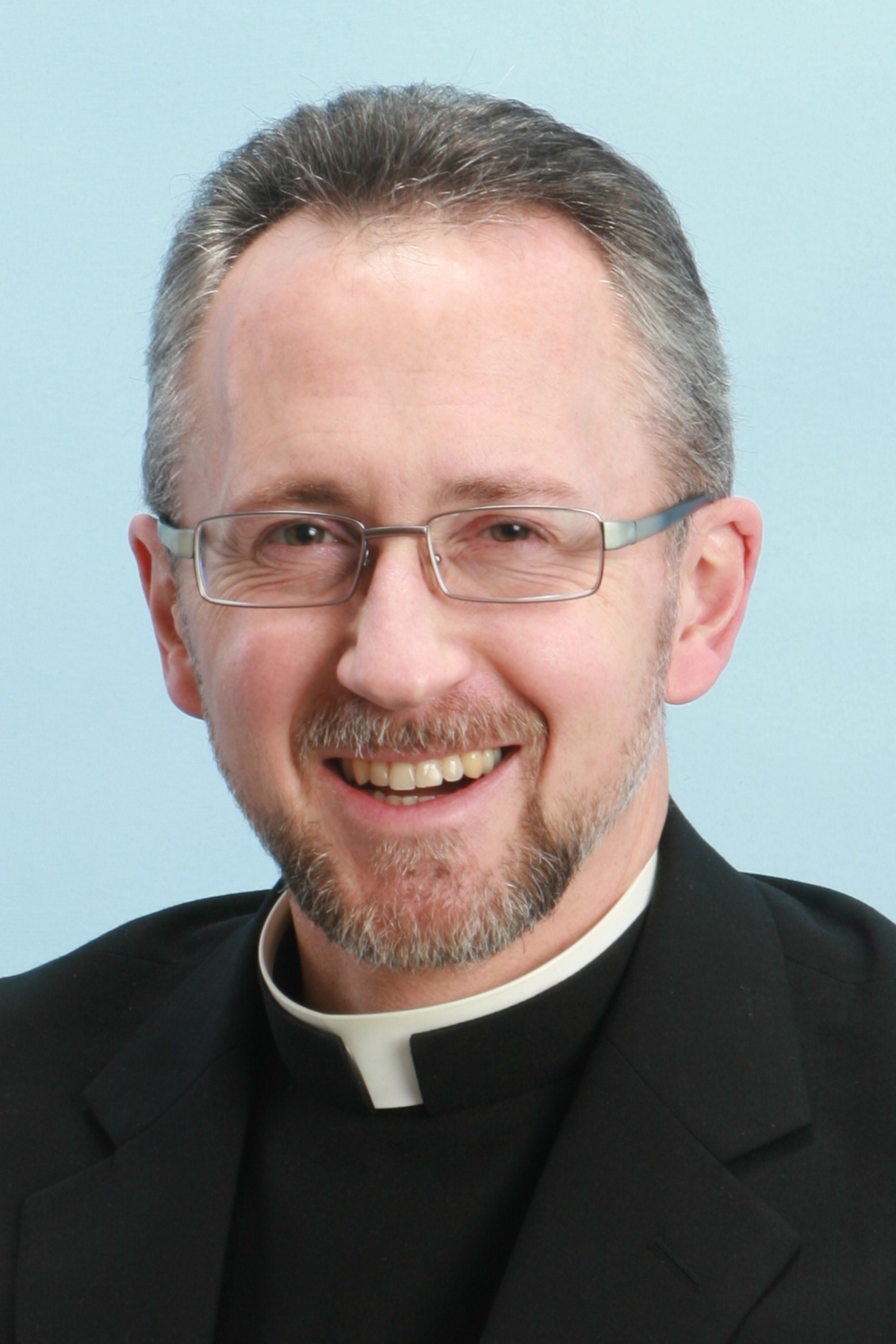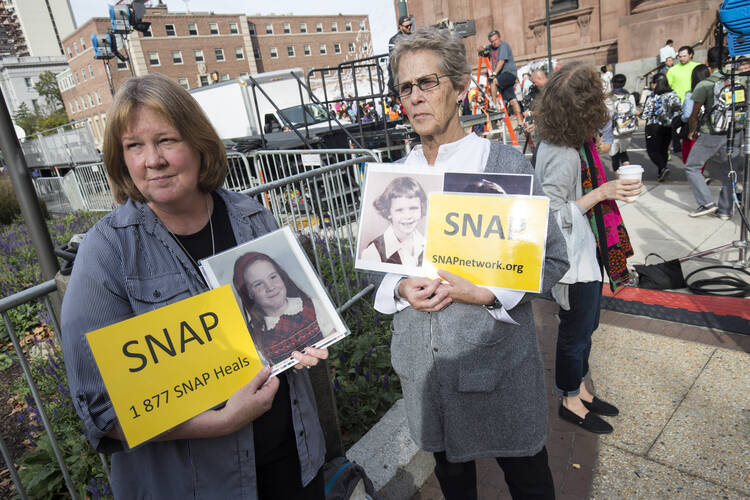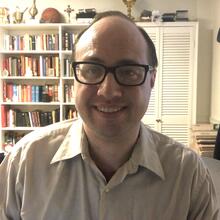Father Thomas Berg isa priest of the Archdiocese of New York who currently serves asvice rector and professor of moral theology at St. Joseph Seminary in Dunwoodie. His new book,Hurting in the Church: A Way Forward for Wounded Catholics, was published earlier this month by Our Sunday Visitor. A former member of the Legion of Christ, Father Berg left the congregation after its founder Marcial Maciel was exposed as a sexual predator. He talks in part about this experience in the book.
I recently interviewed Fr. Berg by email about his new book. This interview has been condensed.
Why did you write this book, and who is it for?
As I share in chapter one, quite honestly, the book began as a kind of therapy—for myself. I had gone through a very traumatic experience in the church as a Catholic priest and it turned my life upside down in many ways. And it also really challenged my faith in Christ and the church. I mean, as readers will discover, I’ve really been in the crucible. So, I began writing. It was a means of working through what had happened.
And it brought me to realize that there are a lot of Catholics out there who have had painful experiences in the church.
For Catholics who have had any kind of painful experience in the church, I offer some guidance toward healing. And for the church as a whole, in the wake of the year of mercy, I offer this book as an examination of conscience of sorts: an invitation to reflect on those areas where we are sorely lacking in charity in our faith communities, an invitation to an essential conversion of heart and to a renewal of the life of charity in our local churches.
In addition to my own story, throughout the book I intersperse the stories of others who have had painful experiences in their walk of faith but who, with God’s grace, have been able to find healing and actually have not only preserved their faith in Christ and their belief in the church, but have become better Christians and better disciples precisely because of the hurtful experiences they endured.

Is it ever the case that wounded Catholics lash out at authority figures like the Catholic hierarchy, or blame the church and its teachings, rather than deal with the real causes of their wounds? Or, in addition to lashing out at a substitute target, is there a danger of over-spiritualizing their wounds as opposed finding a good therapist to help them deal with their issues?
I understand Catholics who believe they were hurt “by the church.” But that experience inevitably is rooted in the hurt inflicted by a member of the church, often someone in a leadership position. It wasn’t “the church” as such that did the hurting; it was a member of the church. And that’s a very important distinction we have to make if hurting individuals are ever going to find healing.
And of course, a misguided manner of over-spiritualizing what we’ve experienced can itself be an obstacle to healing. Sometimes the hurts experienced are very deep. Sometimes they tap into, and become tangled with, other traumas we’ve experienced in life. I have no doubt our Lord can bring healing even to the most complex cases, but he also wants us to avail ourselves of many other human means we have at our disposal. When people over-spiritualize their hurts they might never actually deal adequately with them. It reminds me of the joke about the guy trapped on his roof during a flood—and a neighbor throws him a life-preserver, and someone paddles up to his house in a boat, and a helicopter lowers a rope to him, but each time he refuses the help because “God is going to save me.” When he eventually drowns in the floodwaters, he finds himself before God, and demands to know why God didn’t save him… And I think we know the punchline.
God wants to heal us, but he often wants to bring that healing, for example, through a qualified therapist. I share in the book how a friend of mine who is a professional counselor helped me navigate a lot of the internal turmoil I was experiencing.
My life was turned upside down by a priest sexual abuser who was also the founder of my one-time religious family.
In different places throughout the book, you address head-on the issue of clergy sexual abuse in the Catholic Church. That’s not easy to do as a priest. What motivated you to do that?
My life was turned upside down by a priest sexual abuser who was also the founder of my one-time religious family. So for years I’ve had a great sensitivity to the plight of survivors of clergy sexual abuse. And in terms of our brothers and sisters in the church who are hurting, victims of sexual abuse are at an extreme on the spectrum of hurt.
Sadly in so many ways, Catholics are very reluctant to face the devastation that this crisis has unleashed in the church. People want to keep it at arm’s length and believe that the crisis has passed. For many victims, the crisis is still very much alive. In the course of writing the book, I traveled to speak with and interview two survivors of clergy sexual abuse who were willing to share their stories with me. In turn, I’ve included their stories in the book. Telling their stories is of paramount importance for their healing, and—as I argue in the book—listening to their stories is of paramount importance to heal the church as a whole from this great tragedy.
Your last chapter is titled “The Revolution of Tenderness,” an idea from Pope Francis. What’s the significance of that expression?
In his first apostolic exhortation, “Evangelii Gaudium,” Pope Francis affirmed that the Son of God has summoned his church to a revolution of tenderness. And at the end of the jubilee year of mercy, he reiterated that theme again—to cultivate a “revolution of tenderness” as a fruit of the year of mercy. In my final chapter, I try to explore what that could look like: a far-reaching, repentant and passionate return to lives of intense and intentional agapē, the love Jesus continues to teach to his disciples, the love he wishes to instill in the heart of every human person.
So, was writing the book therapeutic for you? And has your faith grown and been strengthened as a result?
My goodness, yes. The book was a few years in the making. It was like one prolonged meditation on the church. The church, in the end, we always must remember, is a mystery. And Christ’s action and presence in us, and how he envelops us in the church, is also a mystery. But when we allow him to draw us in deeply, even if that means experiencing the darkness of his cross and the all-too-human dimension of the church in her frailty and brokenness, he gives us the grace to surrender, to forgive, to heal, to trust and never despair.
Who have been the biggest influences, living or dead, on your faith?
My mom—in a huge way. Hers was a very constant, simple, gentle kind of faith and piety that she instilled in me almost by osmosis without my even realizing it. But it became my very foundation.Then I think of my first spiritual director, a Capuchin Franciscan priest, friend, confidante, guide and true spiritual father. He was so instrumental, during my high school and college years, in giving shape to my interior life. And then, of course, St. John Paul II. Both spiritually and intellectually, his writings, including his philosophical work prior to being elected pope, have had an enormous impact on my faith, on who I am as a priest and on how I understand the church and what St. Paul calls the “mystery of Christ in us.”
If you could say one thing to Pope Francis, what would it be?
Francis has proven to be an enormously enigmatic figure for many of us—even for those of us who have lived in Latino culture and ministered there. Austen Ivereigh’s The Great Reformer has been a great help in understanding Francis. The pope has been nothing less than prophetic on the message of mercy, and in attempting to shepherd the church into what he calls a “revolution of tenderness”—a theme I build on in my final chapter. I think we’ve gotten that message heard loud and clear, and it will be at the heart of his legacy. But if I could say one thing to him now, I would say, “Your Holiness, now we need to hear you talk more about truth—the truth of the human person, about moral truth and how truth and mercy are not at odds with each other.” That’s something he has, in fact, affirmed, but it seems to get lost in the media accounts of what he says. At any rate, I’d like to hear him develop that line of thinking more.
This article has been updated with the correct publication date of the book under discussion.










The second question, "Is it ever the case that wounded Catholics lash out at authority figures like the Catholic hierarchy...?" sidesteps the fact that the Church is responsible for wounding people in a variety of ways. In order to remain Catholic, a person has to find a way to understand and deal with the policies and actions of the Church that are hurtful.
The misogyny of the Church was hurtful to me even before I went to grade school. It was obvious that girls and women were little valued, had no voice, and were expected to be meek, unappreciated servants to the men. My response was to leave the Church when I entered adolescence.
Upon my return 40 years later, the problem was only partially resolved by the changes of Vatican II. My response this time was to look more closely at the message of Jesus. I cannot do much to change the Church, but I find comfort in realizing that Jesus did not prescribe the Church's misogyny. Jesus made it safe for women to take part in public life by making sexuality private. Jesus authorized women to preach by appearing to women first after the resurrection. And the only human to anoint Jesus was a woman - a fact that is completely ignored in the theology of the Church.
So I look at the Church's doctrine through the filter of "Did Jesus say or indicate that?" If the answer is "No," I do not feel obligated to pay much attention unless the doctrine makes logical sense. As for the idea that the laity should be "docile" to the Church's teaching - docility is a desirable trait in milk cows.
Thank you for sharing your perspective. Let's continue to pray for healing in the Church.